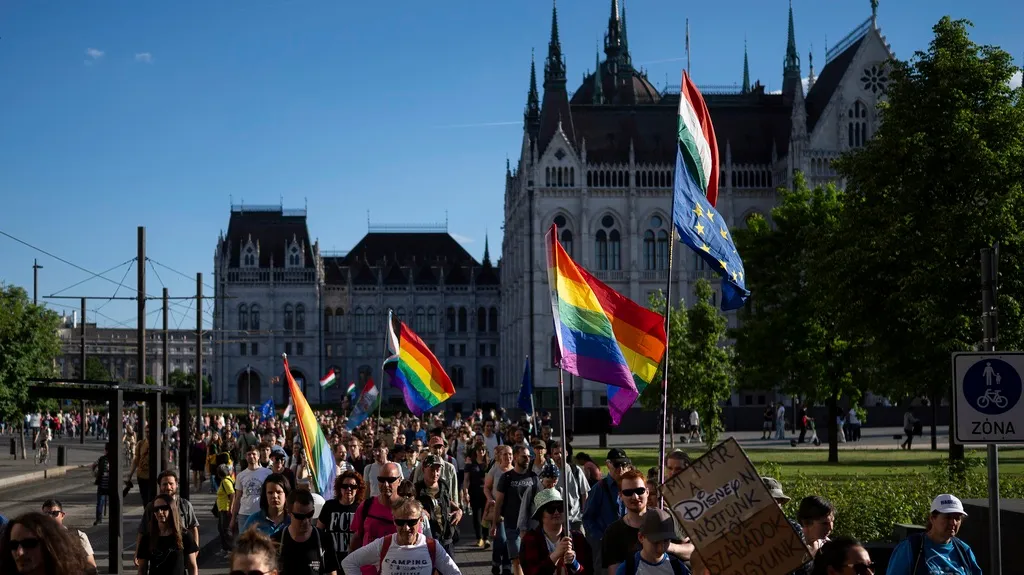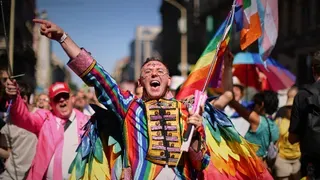March 16, 2013
For LGBT New Yorkers, No Luck of the Irish on St. Patrick's Day
Winnie McCroy READ TIME: 9 MIN.
For decades, instead of celebrating, Irish LGBTs in New York City have spent St. Patrick's Day protesting their exclusion from the Hibernians annual parade down Fifth Avenue in Manhattan. For some years, they and their supporters have marched in an alternative, far smaller, "inclusive parade" in Queens.
Advances seemingly everywhere else -- most prominently, the legalization of same-sex marriage in New York State -- have LGBT activists once again questioning when the Ancient Order of Hibernians' ill-advised policy of LGBT exclusion will at long last come to an end. The inclusion of LGBTs in St. Patrick's Day parades in Dublin and Cork, Ireland, has led to further pressure on the Hibernians, who run the Fifth Avenue parade.
"It remains a very significant personal and political disappointment to me that we have not been able to move parade organizers to a different place as it relates to full inclusion in the Fifth Avenue parade," said City Council Speaker and mayoral candidate Christine Quinn. "Every morning when I wake up I'm Irish lesbian. I'm a package deal. I don't come a la carte. You want me, you get all of me."
Quinn, herself an out-lesbian and out-and-proud daughter of the Emerald Isle, has long refused to march in the Hibernians' parade. She has instead marched in Queens.
Brendan Fay, organizer of the St. Pat's For All parade in Queens, was quick to praise Quinn. "She has been consistent, and appreciates both the principle and the issue," he said. Fay is less than thrilled that Mayor Michael Bloomberg has once again chosen to march down Fifth Avenue as well as his in Queens.
For Fay, the Queens parade would continue to open the doors to all who wanted to march. "Of course we urge people not to march in parades that literally directly discriminate against LGBT people," said Fay. "But we are St. Pat's for All -- we are what we say -- and for a few hours at our parade, we can all find unlikely allies."
As political activist David Mixner noted, Quinn is only one of many New York politicians who refused to march in the parade because of this bigotry and exclusion. Last year, the Irish Foreign Minister condemned the parade, and even the former President of Ireland Mary McAleese declined an invitation to be Grand Marshal.
"The exclusion of LGBT people from Irish celebrations on Fifth Avenue is completely out of sync, and does not reflect at all the Irish experience," Fay said. "At our parade, we read greetings and messages of support from McAleese and President Michael D. Higgins, and Ireland's largest union sent over a banner to be carried in our parade. In 1992, while we were literally barricaded from the Fifth Avenue parade, an Irish lesbian and gay youth group won first prize in Cork's parade."
The Irish Lesbian and Gay Organization (ILGO) and other Irish LGBT groups continue to protest the Hibernians. As many as 250 protestors were arrested in 1993. Similar protests and arrests have occurred in every year since.
Challenges against LGBT exclusion in St. Patrick's Day parades heated up in the Bronx in 1999, when the Lavender and Green Alliance was invited to march but was later informed they would not be welcome. Irish LGBTs are still excluded from parades in Brooklyn, the Bronx and Staten Island.
In Boston, gay men and lesbians pressed so hard to be permitted in 1994 that the private sponsor cancelled the parade after a Superior Court judge ruled in favor of gay marchers.
The U.S. Supreme Court overturned the ruling in the 1995 case Hurley vs. Irish-American Gay, Lesbian, Bisexual Group of Boston, which ruled parade organizers have a legal right to decide who marches. This year, the Boston parade organizers told LGBTs who wanted to march that the parade was full.
"Organizers of the annual St. Patrick's Day Parade have barred LGBTQ people and groups from marching in the Parade for 18 years simply because they are openly LGBTQ," said MassEquality executive director Kara Suffredini. "After years of rejecting MassEquality, in particular, because it is an LGBTQ organization, it seems disingenuous to now ban the organization because the Parade is allegedly 'full'."
This year, LGBT Bostonians will join the nonprofit Mass Equality to march in their own parade, scheduled to begin an hour after the Allied War Veterans Council parade and on the same route.
"To be sure, the LGBTQ community in Massachusetts faces many issues more urgent than the ability to participate in a parade -- youth homelessness, bullying, anti-transgender discrimination, HIV/AIDS, elder abuse, and more," said Suffredini. "But public rejection by an established cultural institution like the St. Patrick's Day Parade is significant in that it's emblematic of the more life-altering rejection our community members face every day."
Last year, some hoped that NBC and parent company Comcast, which owns broadcast rights to the New York parade, would force the Hibernians to change their policy to adhere to the company's diversity policy. Bolstering this optimism was a letter from the FCC stating that Comcast (which sponsors the annual GLAAD Media Awards) must adhere to diversity rules for seven years, lest the merger be undone.
"The idea that a group of LGBT people aren't allowed to participate in a parade in the middle of New York City in the year 2012 is completely out of touch with a majority of Americans and it is frankly indefensible," GLAAD spokesperson Herndon Graddick said in a 2012 statement.
For now, however, the 1995 court decision protects the Hibernians' right to exclude LGBT marchers, while Irish LGBTs must be content with inclusive alternatives.
Queens Presents an Inclusive Alternative
After years of protesting and being arrested at the Fifth Avenue parade, a fed-up Fay decided that he had had enough of being excluded. Teaming up with local legislators like City Councilmember Daniel Dromm (then a community advocate and schoolteacher), Fay started his own St. Patrick's Day parade.
In 1999, after being arrested on Fifth Avenue, in the Bronx and then in Brooklyn, Fay sat down with Dromm and labor organizer Ellen Duncan. "Why can't we organize a parade in Queens that will be known for its inclusiveness?'" Fay asked them.
Fay reached out to community groups, elected officials, cultural organizations, political parties (the Greens, socialists), local schoolchildren, along with assorted marchers, musicians and performers. Meanwhile, Dromm navigated the tricky maze of paperwork necessary to hold a parade in New York at the beginning of March.
"Brendan came upon a very positive way to influence what was happening regarding the exclusion or Irish lesbians and gays in the Fifth Avenue parade," said Dromm. "Many people showed up for the first years to help with the logistics of running a parade. After fighting tooth and nail with District 24, I was allowed to invite the parent's association from my school to march. They came with a large group of kids, two of whom presented First Lady Hillary Clinton with flowers."
A Coup When Hillary Joins Inclusive Parade
That first year, Fay pulled a coup when Clinton agreed to march in the 2000 St. Pat's for All parade. The Queens parade has grown each year, with a full cadre of the city's elected officials, including Bloomberg, City Comptroller John Liu, and almost all of Queens' leaders including newly-elected Flushing Congresswoman Grace Meng this year.
The parade includes Mexicans honoring San Patricio; Queens schoolchildren doing Irish stepdancing; rowdy Occupy Wall Street protestors; new this year: Turks. The Ottoman Empire sent ships full of food to Fay's home town of Drogheda, Ireland, during the Irish Potato Famine in the 1800s.
Even more significant, and the New York Fire Department's Emerald Society Pipes and Drums Band were there in full swing after years of the parade featuring a lone piper.
"I think that we learned in Sunnyside and Woodside what Brendan already knew," said Dromm. "We've seen a sea change in Irish and Irish-American views toward LGBT people. They may at first have seen the parade as something fearful, but as we kept moving forward, more people changed, the bars relaxed and realized the economic advantage to have the streets filled with people on a March morning, and that it was all around a good thing for everyone involved."
’Don’t You Gays Have Your Own Parade?’
"Don't you gays already have your own parade?" is a question Fay admits is often lobbed at him and others who continue to fight for inclusion in St. Patrick's Day parades here and elsewhere. While Fay celebrates LGBT Pride events, he maintains that excluding Irish gays -- or any cultural group -- from a celebration of their heritage is just plain wrong.
"Cultural identity is a vital part of life in the city, and cultural celebrations ought to be welcoming to all, and ought not to discriminate against LGBT groups," Fay said. "We belong as much in our own culture communities as well as in the LGBT community."
Dromm agreed, adding that those who use Roman Catholic doctrine to justify LGBT exclusion are guilty of cherry-picking to suit their own petty prejudices.
"It's a disgrace that some of those Hibernians -- not all of them, by the way -- are still employing bigotry and prejudice against gay people," said Dromm. "I really believe that the overwhelming majority of Catholics support LGBT rights. It is time that the hierarchy of the church realizes what their membership already knows -- that these are human and civil rights."
Fay remains upbeat that he will eventually prevail. For now, he remains pleased about having figured out how to create a space where he can march side by side with people who agree that exclusion equals discrimination.
"Out of the experience of being excluded, we have created a very beautiful expression of what our cultural celebrations can be, where Occupy protestors march next to elected officials, where Dignity, PFLAG and MCC can march under rainbow flags and Irish banners and local residents, businesses and bars are finally coming aboard," he said. "I hope to inspire other groups who are fighting for inclusion in parades."
Fay is encouraged by the success of LGBT groups' success in the annual Chinatown Lunar New Year Parade, which some now call the Lunar Parade for All.
"St. Pat's For All has become a way to find unlikely allies and a place for dialogue," said Fay. "People did not think this parade would last more than a year or two, but after 14 years it continues to grow. Nothing has changed on Fifth Avenue. That exclusion goes on, but other St. Pat's parades and cultural celebrations are becoming more inclusive. Our struggle around this issue has had a ripple effect. It takes time, but I can definitely see that a change is coming."
Winnie McCroy is the Women on the EDGE Editor, HIV/Health Editor, and Assistant Entertainment Editor for EDGE Media Network, handling all women's news, HIV health stories and theater reviews throughout the U.S. She has contributed to other publications, including The Village Voice, Gay City News, Chelsea Now and The Advocate, and lives in Brooklyn, New York.






